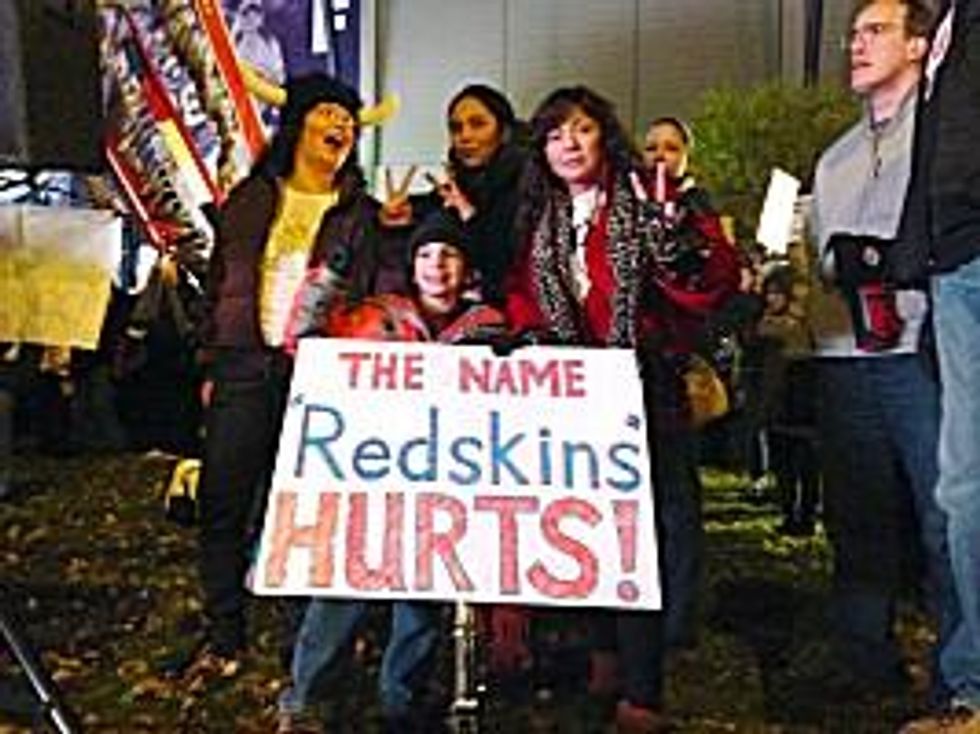In the mid-1950s I visited several tribal areas in the west, including the Blackfeet and Crow Reservations. The poverty, despair and cultural devastation were everywhere. In 1956, as a Harvard Law Student, I researched and wrote a long article titled "American Indians: People Without a Future" in the Harvard Law Record. So infrequent were such reports that the Indian Health Service ordered 10,000 reprints.
The Harvard Law School Community ignored this plea for justice for the first Natives who have suffered for generations and seen the genocide of their tribal societies. Both the students and the faculty had other ambitions on their minds.
I am reminded of this sad episode in my legal education as the controversy over the use of the mascot word "Redskins" by the NFL's Washington football team becomes hotter and hotter. Our culture today pays far more attention to ethnic, racial and gender slurs (many of them fortunately phased out of most public conversations) than to the brutal conditions of penury, discriminating violence, addiction and repression that represent contemporary reality.
Should any of these baleful epithets emerge on campuses the students become enraged, show up at gatherings and denounce the authors or the anonymous bigots. Would that they extend that moral indignation by showing up at visiting lectures or symposia regarding the actual conditions underlying these obnoxious labels and engage these injustices.
Care should be taken that word denunciations or word victories do not distract from their underlying realities. Or even worse, become substitutes for addressing the situations on the ground.
Just this week, a rare meeting between Barack Obama and tribal leaders at the White House saw the Oneida Nation representative praise the President for saying he would change the Redskins name if a sizeable group of people were offended by it. The representatives applauded. That was the public news, although other serious issues were probably brought up but took a back seat to the "Redskins" brouhaha.
The legacy of domination by the white man of the native tribes - over thirty of them wiped out of existence - remains to this day. Recall how most Americans have been taught the history, starting with Columbus "discovering" America and the so-called civilizing of the indigenous peoples by European colonizers.
Consider The Epic of America by James Truslow Adams published with great fanfare by Little Brown & Atlantic Monthly Press in 1930. Prominent historians could hardly contain their praise: "The best single volume on American history in existence," wrote the famous Allan Nevins. "A brilliant and exciting story of America," said Henry Seidel Canby. "Unsurpassed as a single-volume history of the United States," touted Professor David S. Muzzey. The New York Times and the Saturday Review of Literature waxed eloquent over Adams' work. The Book-of-the-Month Club selected it for its members.
Today, Adams' historical analysis and class-conscious, anti-plutocratic Epilogue would be considered reflective of a progressive view of historical reality regarding the downtrodden and the inequalities of wealth and political voice. Few would have considered him a racist, except the first Natives.
Here is an example of Adam's reflections of the first Native Americans: "the huge continent north of Mexico was so sparsely inhabited as to have supported only a half million savages or barbarians of the race we call Indians.... Their nervous systems were unstable and they were of a markedly hysterical make-up peculiarly susceptible to suggestion. Cruel and revengeful...they were childishly lacking in self-control."
"In 1524, the savages dwelling at the mouth of the Hudson River," or "In 1584, the savages on the North Carolina coast... by 1590 the sugar mills were exporting two hundred thousand pounds a year from Santo Domingo alone, where the Indians had learned to eat beef instead of human flesh." Adams wrote of the Puritans being attacked by "savage men and savage beasts." No mention of what these white colonizers later did to the New England tribes, including deliberately giving small-pox contaminated blankets (an early biological warfare tactic) to the Pequots with devastating epidemic results.
Characterizing the Spaniards and French as not having "any race prejudice against the native population," he wrote that the Spaniards "transformed a very large part of the great native population from barbarism to civilization." These tribes might be forgiven for wondering what level of genocidal, enslaving, barbarism that "civilization" had to inflict on them in order to save their "savage" souls.
The Epic of America went through twenty-two printings, attesting to its mass popularity, and was used into the 1960s by scholars, teachers and students.
To his credit, Adams debunked numerous myths taught in American history, including decrying the corporate, commercial "symptoms of our slipping down from civilized standards of life, as are also our lawlessness and corruption, with the cynical disregard of them by the public."
He assailed the "very marked injustice" in the distribution of "the national income." He declared that "the Epic loses all its glory without the [American] dream." "No ruling class has ever willingly abdicated. Democracy can never be saved, and would not be worth saving, unless it can save itself."
The broken treaties and the pushing back of the "red men" from their lands were briefly mentioned, along with the defrauding of "the original owners." The overall rendition of his "epic" history, however, was that the white man's civilization was brought to the "revengeful" "savages." Or what was left of them and their distinctive cultures.
Dan Snyder, owner of the Washington football team, needs to absorb some of these history lessons.
